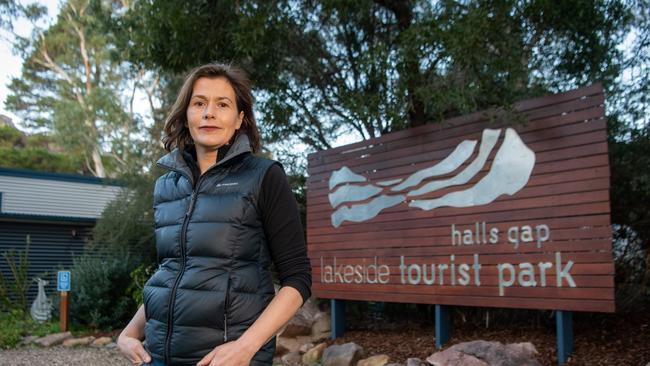Farmers’ concern over push to include tourism in Working Holiday Maker Program
Farmers are concerned a recommendation to change the working holiday visa could make getting harvest workers even harder, but the tourism industry says they need them too.

A GROWING push to include the hospitality sector in the working holiday visa program is alarming farmers, who fear they will not be able to compete with cushy cafe jobs.
Tourism operators facing the worst workforce shortage they’ve ever seen are pressuring the Federal Government to classify tourism as an essential sector for backpackers to work in, as is the case for agriculture.
“Why is it more critical to help a farmer than a business owner who is providing 500 people a break away?,” Halls Gap Lakeside Tourist Park owner Josephina McDonald asked.
The Working Holiday Maker Program inquiry last year recommended working holiday visa holders (subclasses 417 and 462) be able to work in tourism and hospitality roles as part of their 88 days or six months to qualify for a second and third year WHM visa.
Holders of 462 visas are currently able to only work in tourism and hospitality in northern Australia
But farmers say this would lead to an even more desperate situation in attracting people to harvest work.
“That will be the key impact for this decision and it’s disappointing that the Government is allowing the system to in-fight and try to take workers away from each other,” VFF horticulture group president Nathan Free said.
“Farmers and ag businesses are already going through enough pain at the moment, we’ve got to keep fighting for the right to farm basically.”
Mr Free said the inquiry’s recommendations would put strain on an already struggling system.
“With hospitality and tourism looking at the same market of employee as agriculture desperately requires, it creates a lot of issues within the whole system.”
Spanish backpacker Laura Ramirez Gomez, who has worked on a farm and in hospitality, said the choice of where to work would be an easy one for most.
“Definitely I think people would prefer hospitality,” she said.
“Farm work is really hard and I’ve heard from friends there are farmers that take advantage of the backpackers, treating them really bad, not giving them minimum resources to live in … because they know we really need that job and we don’t have many options.”
She said hospitality work was preferable as it offered a full-time contract and all the rights, whereas farm piece rates were not ideal for backpackers like herself.
Tourism Accommodation Australia chief executive Michael Johnson wants an immediate change to the visa rules during a “critical stage” for the tourism sector.
“We’ve got a labour shortage crisis at the moment that’s at a very difficult stage and something we haven’t seen for some time,” he said.
TAA also wanted tourism to be designated an essential service for the Pandemic Event Visa and to allow workers to work for the same employer for more than six months.
Josephina McDonald said her business was at a breaking point and would be losing more workers who were leaving to complete their required farm work.
“I have five backpackers leaving between now and May so I am five staff members short but demand is higher than ever,” she said.
She said she is having weekly conversations with the Minister for Tourism Dan Tehan’s office, who says is “taking it very seriously”, about getting some immediate action on changing the visa considerations.

“If the tourism sector was labelled a critical sector, all those backpackers would have been able to work for us could stay. We want to see if they can they review those eligible industries to widen the opportunity for backpackers and the industry and spread it out a little bit better,” she said.
Mr Tehan’s responded to The Weekly Times after this story went to print, saying: “the Government will continue to explore further options to support Australia’s economy during the pandemic. In the first instance, our visa system must support public health measures and settings should not displace job opportunities for Australians. Where there are continuing labour shortages in the tourism industry, I will advocate for backpackers and other visa holders to fill those vacancies.”.
Mr Johnson said these changes were necessary to get the industry to rebound after an incredibly tough 12 months.
“We’re now stymieing our revenues based on labour shortages- I’ve never seen it this bad before.
“You’ve got a situation where, if we have a busy weekend, we can’t fill to capacity because we don’t have the staff,” he said.
The latest ABS data shows there are 27,600 job vacancies in the accommodation and food services sector, compared to 14,500 in November 2019
Meanwhile, the ag workforce reached a record low a shortage of 26,000 workers last month.
Mr Free said the VFF wanted government help to provide a consistent workforce.
“We’re after some surety so that we can keep supplying food to the consumers of the country.
If we don’t have that then things are going to be rough for everyone,” he said.
MORE


